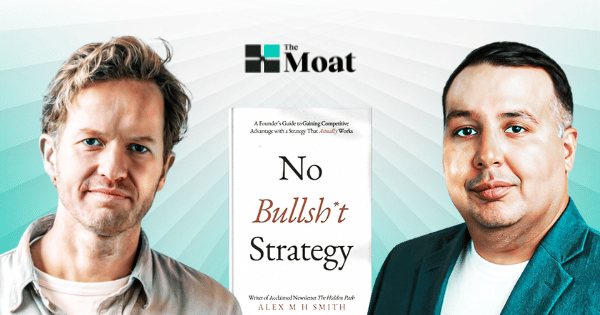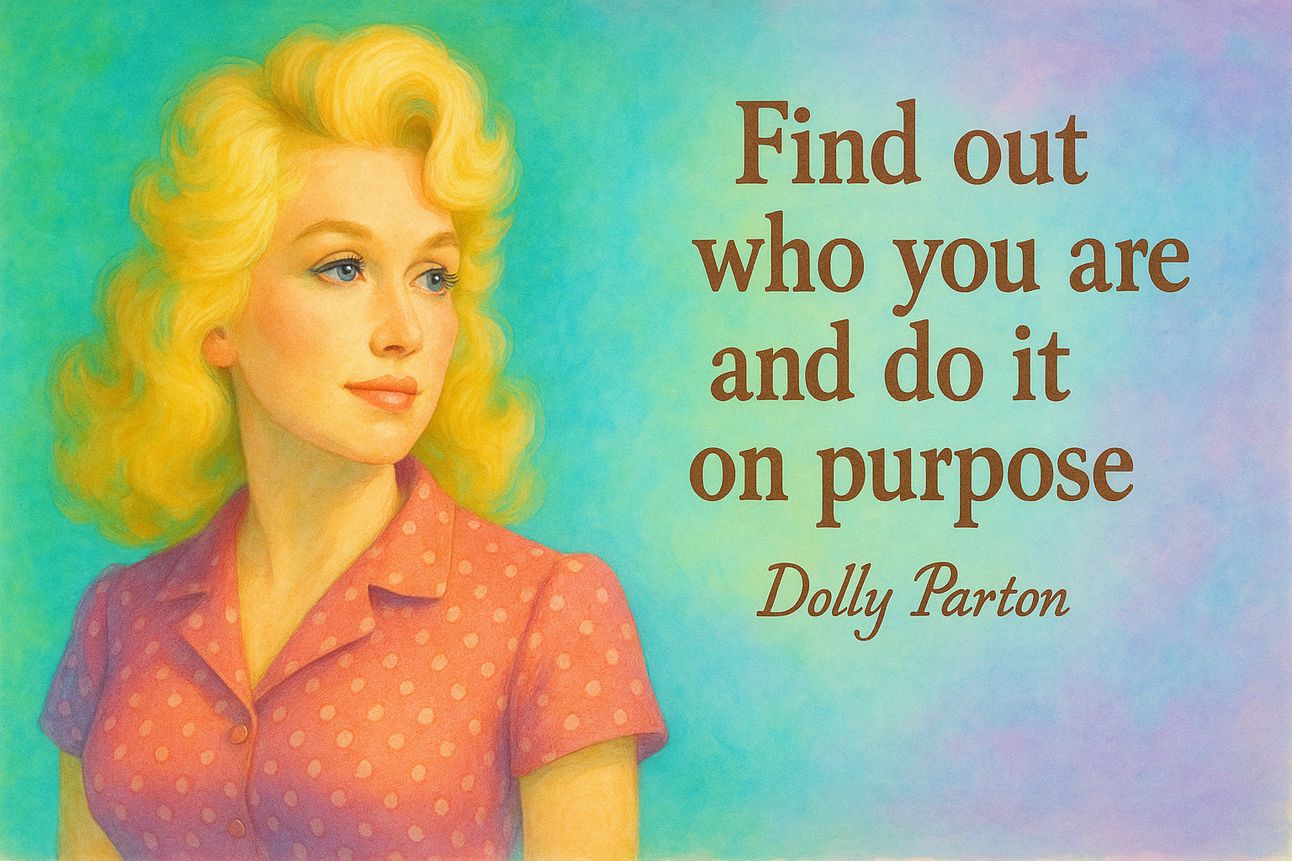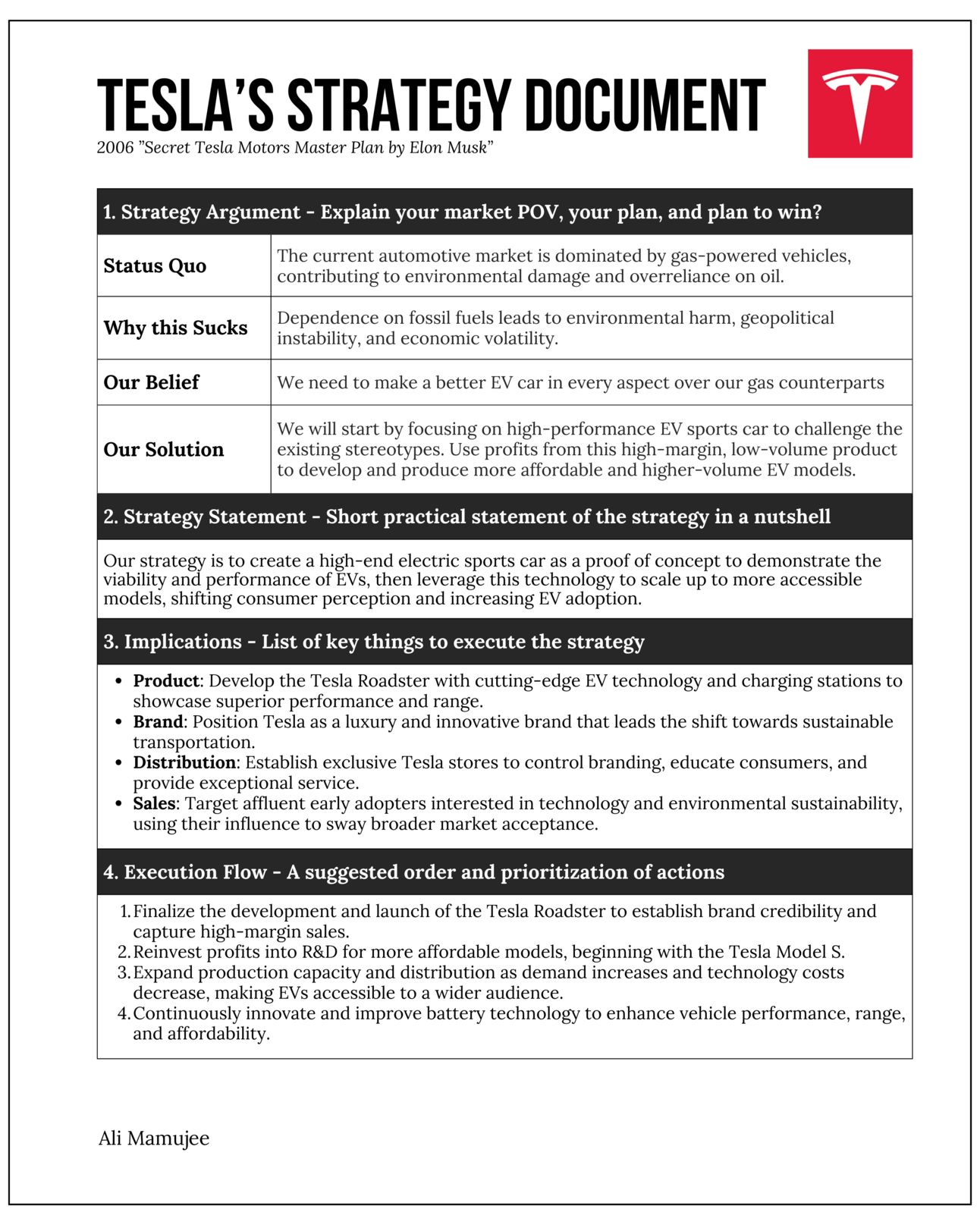
I asked Zohra (my wife) what I should call my readers. The conversation went something like this:
Ali: What about Moaters?
Zohra: Moaters!? Noooo. That sounds like motor-boaters.
Ali: 😕

Intro
Hey Moater-boaters,
I'm fired up about this one.
For years, I've been obsessed with cracking the code on strategy, how to craft it and actually execute it, regardless of company size, stage or industry.
I've probably tortured myself by reading every strategy book known to mankind. But amid the mountains of fluffy frameworks and academic nonsense, only one book cut through the noise for me: Alex M H Smith's "No Bullsh*t Strategy."
Alex and I recently had a 2-hour jam session to shape this issue for you.
What We'll Cover:
The Dolly Parton principle - Discover your authentic, uncopiable advantage
The 3 Strategy Rules - Avoid the mistakes nearly all companies make
Tesla's perfect strategy blueprint - Create your own winning roadmap
My promise: after reading this, you'll understand strategy better than 99% of MBAs and executives out there. Let's dive in.


Why I Give a Shit About Strategy
At my last company, a Fortune 500, they assembled the dream team: ex-McKinsey consultants with Ivy League MBAs locked in rooms for six months, crafting THE STRATEGY.
Then came the big reveal one December morning. A global all-hands Zoom call with 25,0000+ attendees where executives proudly unveiled their masterpiece over a 45-minute call.
Somewhere around slide 17, I caught myself muttering out loud:
"No one is going to remember this shit."
Spoiler alert: I was right.
By Q1, every team had created their own isolated OKRs with zero connection to THE STRATEGY. When I asked colleagues if they'd referenced it, they actually laughed. "Of course not."
This isn't the exception — it's the norm. And it's exactly why most businesses are stuck playing an expensive game of strategic theatre while the real winners quietly dominate.
Did someone forward this email to you? Click here to subscribe so you don't miss out on future issues.

The Dolly Parton Principle That Changed Everything
In his book, Alex shared a deceptively simple Dolly Parton quote that literally changed the trajectory of my life:

Read the full story on LinkedIn →
This flips traditional strategy on its head. Most companies ask "Where do we want to go?" when they should be asking: "Who are we uniquely suited to be?"
Alex explained on our call:
"People and businesses are not free-floating agents. They are engaged in a constant negotiation with the environment... Choice doesn't even come into it. It is a journey of discovering what is already pre-ordained and then getting on board with it."
The most successful strategies aren't fabricated – they're discovered. They match your authentic strengths with overlooked market opportunities.

Please Memorize These 3 Strategy Rules
Of the 10 strategy truths I've learned from Alex, I keep these 3 top of mind when evaluating other companies' strategies. As you read them, consider how your company compares.
1. Are You Only, or Better?
Don't compete on "better". Don’t ever write “become #1 at…”.
Create a category of 1 where you create new value to the world.
When Tesla entered the EV market, they didn't build a more efficient Prius. They built a badass car that happened to be electric.
In Alex's words: "High performance EV would be an oxymoron to most people because they would think, 'Well, high performance is somehow naughty. And how could something green ever be naughty?”
Tesla's genius wasn't improving existing EVs, it was creating entirely new value. While competitors built practical, eco-friendly "green cars" that sacrificed performance and style, Tesla turned that trade-off on its head. They delivered a superior driving experience, cutting-edge tech, and status signalling that made their cars desirable regardless of being electric.
Ask: Where are we competing on incremental improvements? What new value could we create that doesn't exist today?
2. What Are You Sacrificing?
Strategy comes from what you refuse to do.
Tesla made bold sacrifices that horrified industry experts. They abandoned dealerships entirely, scrapped traditional advertising, ignored the affordable market segment, and committed to an all-electric lineup when others hedged with hybrids. Each sacrifice focused their resources on what mattered most: building vehicles that would shatter expectations of what an electric car could be.
While competitors dabbled in EVs as side projects, Tesla's all-in approach created focus that accelerated their innovation cycle. Their sacrifices weren't weaknesses, they were strategic choices that amplified their strengths.
Southwest sacrificed multiple plane models (boldly chose Boeing 737s only)
Apple sacrificed traditional enterprise customers
Netflix sacrificed physical stores
Ask: Which opportunities should we deliberately walk away from to dominate our core?
3. Does it Drive Immediate Action?
Great strategy creates an energy current that spreads throughout the organization by being ridiculously easy to act upon.
The brilliance of Tesla's strategy is how clearly it translates to action for every employee. Elon's original strategy could be summed up in three powerful lines:
"Build the best car anyone has ever driven, and oh yeah, it happens to be electric. Start with cars only the wealthy can afford, then use that money to build cars everyone can afford. Do everything ourselves so we don't depend on the industry we're disrupting."
This clarity meant that every engineer, designer, and salesperson knew exactly what to prioritize and what to ignore. No strategy decks required.
When your strategy is this clear, people don't need permission to take action; they simply know what needs to be done.
Ask: If you asked any employee what your strategy means for their daily work, would they have a clear, immediate answer?
Remember: Only, Sacrifice, Action

Start learning AI in 2025
Keeping up with AI is hard – we get it!
That’s why over 1M professionals read Superhuman AI to stay ahead.
Get daily AI news, tools, and tutorials
Learn new AI skills you can use at work in 3 mins a day
Become 10X more productive

Anatomy of a Great Strategy Document
I always knew PowerPoint was a terrible medium for strategy. It lacks emotion, and no one has ever forwarded a strategy deck that created any lasting magic.
Desperate for the right format, I reached out to Alex and asked if any company examples could serve as strategy inspiration.
He pointed me to Elon's 2006 masterpiece: "Secret Tesla Motors Master Plan." Elon wrote this when Tesla didn't even have a working prototype.
There it was. A perfect example of what I described in Issue 001– Babe Ruth pointing to the fence before hitting the home run.
Here's what makes this specific strategy narrative so good:
It checks all of our 3 strategy boxes above: It makes Tesla the "only" (high-performance EV), identifies clear sacrifices (fu*k dealerships), and clear action.
It reads like Elon's grabbing a beer with you. Simple language, clear logic, and so concise you could repeat it to a bartender after two drinks.
It creates believers, not just customers. The document isn't selling cars – it's recruiting allies in a transportation revolution. The best strategies don't just describe products; they describe movements the help create a self-fulfilling prophecy.
One of my most popular LinkedIn posts remains taking Alex's recommended strategy document outline and applying it to Tesla’s strategy example (see below)
This is how I'd encourage all of you to write your own strategy documents. No jargon, no complexity. Below, I provide you with resources that dive deeper into this.

Inspired by: Alex M H Smith’s “How I Actually Write a Strategy Document”

Strategy Resources Worth Your Time
For those wanting to go deeper on strategy and learn more, I will point you to two resources:
How to Write a Business Strategy (that isn't BS) – I am a visual learner and Alex recently dropped his first YouTube video that breaks down the above strategy outline above in great detail. If you want to create your own one-page strategy doc for your company, watch this.
The Strategy Shortcut System – If you are deadly serious about revamping your strategy and want access to Alex directly, he recently created what I consider the best strategy course online. I have gone through it and I must say, it’s the best kept secret on the internet (and I am not even getting paid to say this).
Tell Alex you are a “Moater” and I am sure he will treat you twice as nice.

Something That Lives Rent-Free In My Head

Alex shared on our jam session his favorite test for validating a strategy that I can’t stop thinking about:
"Every strategy should be able to be described in a pejorative way, like in a way that makes it sound like a bad thing."
So I asked AI to come up with its best company insults. Here are 3 of my favorite.
Southwest: "Cattle-class seating with obnoxiously perky flight attendants."
Peloton: "Stationary bikes for rich people's dusty spare bedrooms."
Rolex: "Overengineered status symbols for insecure executives."
If your strategy cannot be described negatively while still being accurate, there's no substance there. True uniqueness always creates polarization.

Hope you all have amazing weekends.
Til next time,
—Ali
P.S. We just hit 110 subscribers! That's roughly 109 more than Zohra thought would read this. Help me prove her spectacularly wrong by forwarding this to someone or a team that you believe would enjoy. Goal: 300 by the end of June.
P.P.S. Unlike most newsletters, this one comes with a real human (me) who types this from a blank document every week. I am sitting at my desk right now, waiting for you to respond to me. Seriously, hit reply and tell me anything or share with me an idea for next week’s issue.

About Me: I’m Ali, a former tech exec who now advises growth-stage B2B companies on strategy & GTM execution. I am also an aspiring writer. I am Houston-based and predicting here first, the Rockets and Texans will both win championships in 2026. Learn more about me on LinkedIn, and say hello.



